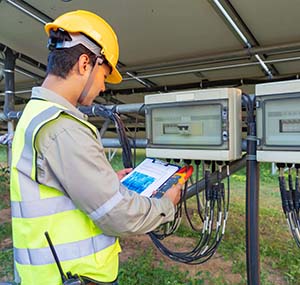Overview
Agricultural engineers study and apply engineering science and design principles for the use and development of agricultural land, buildings, machines and equipment across a diverse set of agricultural projects. They design, build and test equipment and processes that reduce operation cost, eliminate emissions, improve operator safety and improve sustainable agriculture practices.

What responsibilities will I have?
- Design solutions for agricultural equipment based on product requirements
- Interpret and design complete blueprints and drawings for production use
- Assist in installing and testing motorized equipment
- Take measurements and record data and observations
- Communicate with clients, farmers, stakeholders and government departments
- Test designs and recommend changes
- Perform a wide range of engineering technology tasks using computer-assisted software and equipment
- Understand and utilize detailed, technical information to solve complex problems
- Collaborate and consult with other engineers and professionals on projects
- Work on waste management system including animal waste and fertilizer runoff
- Communicate with clients, farmers, stakeholders and government departments
- Review research and literature relating to current discoveries in the field
- Engineer the construction of agricultural buildings and storage facilities to engineer a system that is most cost efficient
- Plan projects that adhere to timelines and budgets
- Supervise the construction of flood and water systems
- Participate in long term studies of agricultural structures
- Design equipment and machinery used for field preparation, seeding, spraying, harvesting and transporting agricultural products
- Ensure projects designed follow with local safety and health regulations
- Prepare and present technical reports, meet with clients and communicate technical concepts to all stakeholders
- Advocate for sustainable agriculture on a local and national level to interested parties
What education and training is required?
A bachelor's degree in agricultural, civil, environmental or chemical engineering is required. Having an agricultural background, especially in production, may be useful, but is not essential.
To pursue a career as an Agricultural Engineer:
The following high school courses are recommended: agricultural education, physics, advanced mathematics, computer skills, advanced sciences, agricultural mechanics and English.
Where can I work?
Environmental engineers are typically employed by producers, manufacturers and distributors of agricultural machinery, power companies, consulting firms, energy industry firms and agri-food processing firms.
Future Job Market / Outlook
Excellent
Suggested Professional Organizations and Associations
- National Society of Professional Engineers
- The American Society of Mechanical Engineers
- American Society of Agricultural Engineers
- American Society of Agricultural and Biological Engineers
